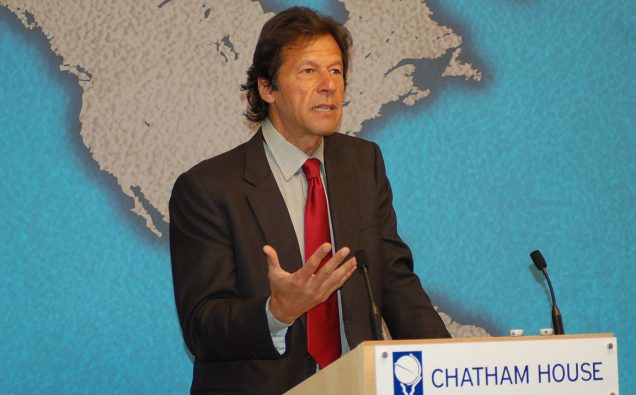
Photo: Chatham House/Wikimedia
Imran Khan has won perhaps the biggest prize of his life with a victory in 2018 elections that has come after more than two decades of political strife. That win, however, comes at a time when Pakistan is at a crossroads and Khan must urgently wrestle with some of the long-ignored challenges stalling Pakistan’s progress.
Having waged a successful campaign against corruption among the Pakistan Muslim League (N) elites, broken into the dynastic logjam and brought Karachi back into the political mainstream, the captain must be savoring the moment.
But the moment he holds reigns of the country as prime minister, a myriad of dysfunctions will test his mettle. The woeful education and health conditions, absence of enough employment opportunity for the young – all of which exacerbate poverty and amount to denial of socioeconomic justice and basic democratic rights to people – the heavily tilted balance of power in favor of military establishment, a lack of confident leadership at the helm of national institutions, foreign relations, disregard for merit, militancy and extremism, status of minorities and women, and the list goes on and on.
But one sore point for the country that threatens to derail all prospects – that have been making headlines due mainly to China Pakistan Economic Corridor – is the sagging economy.
Khan and his team of advisers need to start with an objective appraisal – an introspection of the national economy away from the sloganeering and politicking that have harmed the country so much including under the PML(N) government which started off well in 2013 but lost its way.
Here are some of the probing thoughts:
Why is it that after a period of economic upsurge Pakistan’s economy stagnates? Why is it that the benefits of high growth phases do not trickle down to the masses? What specific areas of the economy and finance need to be fixed? Why has Pakistan not been able to expand its exports? What are the areas that can help Pakistan reap immediate benefits? What will it take to ensure that economic growth could be sustained? Does the banking system help startups and has a system to check flight of the capital?
Pakistan’s economy has shown a familiar pattern of high growth and sudden slump. The economic uptick happened during Pervez Musharraf years. During Asif Ali Zardari’s five years, the growth never actually recovered. The Nawaz Sharif government did initially well but faltered midway as politics undercut genuine the scope and pace of reforms.
The post-9/11 years show that the World Bank’s development program long-term loans, the IMF’s bailout packages have just been stopgap arrangements that have helped recover the economy but never supported by real reforms at national and grassroots level.
In the immediate perspective, Pakistan’s failure to realize tax revenues has been an open wound. Unless Pakistan expands its tax net – with the exception of tax breaks for new businesses or investments – the country will not be able to generate its own money that may go into infrastructure development, bridge the budget deficit and improve tax to GDP ratio. According to a report, the Federal Board of Revenue missed tax collection target last year by Rs 250 billion.
It is because of this failure that successive governments in Islamabad have resorted to internal and external borrowing to patch up things.
Since the reformed National Finance Commission Award allows provinces to collect taxes on their own, all provinces have a responsibility to do that. Yet, the federal and provincial government have been unable to show any worthwhile improvement – mainly due to political expediency of elections.
Then there is the question of the country’s exports in both traditional agrarian and modern fields like IT. Diversification and jump in exports depend on a range of factors. Incentives should target expatriate Pakistanis willing to invest in the country.Improving education and health through investments and reforms are almost as urgent that demand earnest attention from day one of Khan’s government. According to Pakistan’s official Multidimensional Poverty Index (MPI) four out of ten Pakistanis live in poverty.
The Pakistan Tehreek-i-Insaaf government will begin with both challenges and advantages. A series of power generation projects under the CPEC have helped the country deal with electricity crisis, and provide an opportunity to speed up manufacturing and industrial growth. The PTI’s success in Karachi, Khyber Pakhtunkhwa and the largest Punjab province, as well as its plan to be part of a coalition government in Balochistan brings the incoming prime minister a rare political opportunity to carry out economic reforms.
Islamabad, under Imran Khan, will also have to have pursue close cooperative relations with neighbors India – with Kashmir conflict posing a perennial challenge – and Afghanistan to support a stable regional economic outlook. In foreign relations, the U.S.-Pakistan relations will also be key to giving the new government a hopeful start. Any future IMF or World Bank programs will need Washington’s nod. U.S. Secretary of State Mike Pompeo’s statement that the Trump Administration sees no rationale in American taxpayers’ money – to be part of any future IMF bailout package for Pakistan – going to China through Pakistan, which has to repay loans to Beijing, one of its major creditors.
Imran Khan and his likely pick for finance minister, Asad Umar, have their work cut out for them to steer Pakistan out of economic travails while also keeping close cooperative ties with the United States and China.
Imran Khan will have to start off realistically and without any grand hopes of getting aid from its international friends. Putting economic house in order will be the key pillar for Khan’s election pledge to put people first.





![Photo:By Rahib ALi (Citizen)) [Public domain], via Wikimedia Commons](https://www.viewsnews.net/wp-content/uploads/2016/01/IICROAD.jpg)













